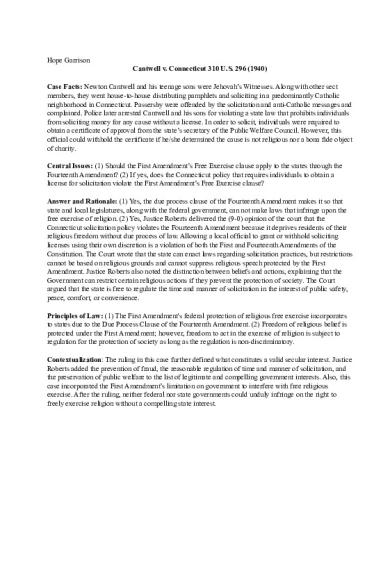Cantwell v. Connecticut PDF

| Title | Cantwell v. Connecticut |
|---|---|
| Course | Con Law Rghts Liber |
| Institution | University of Georgia |
| Pages | 1 |
| File Size | 64.6 KB |
| File Type | |
| Total Downloads | 12 |
| Total Views | 182 |
Summary
Professor Denison Case Brief...
Description
Hope Garrison Cantwell v. Connecticut 310 U.S. 296 (1940) Case Facts: Newton Cantwell and his teenage sons were Jehovah’s Witnesses. Along with other sect members, they went house-to-house distributing pamphlets and soliciting in a predominantly Catholic neighborhood in Connecticut. Passersby were offended by the solicitation and anti-Catholic messages and complained. Police later arrested Cantwell and his sons for violating a state law that prohibits individuals from soliciting money for any cause without a license. In order to solicit, individuals were required to obtain a certificate of approval from the state’s secretary of the Public Welfare Council. However, this official could withhold the certificate if he/she determined the cause is not religious nor a bona fide object of charity. Central Issues: (1) Should the First Amendment’s Free Exercise clause apply to the states through the Fourteenth Amendment? (2) If yes, does the Connecticut policy that requires individuals to obtain a license for solicitation violate the First Amendment’s Free Exercise clause? Answer and Rationale: (1) Yes, the due process clause of the Fourteenth Amendment makes it so that state and local legislatures, along with the federal government, can not make laws that infringe upon the free exercise of religion. (2) Yes, Justice Roberts delivered the (9-0) opinion of the court that the Connecticut solicitation policy violates the Fourteenth Amendment because it deprives residents of their religious freedom without due process of law. Allowing a local official to grant or withhold soliciting licenses using their own discretion is a violation of both the First and Fourteenth Amendments of the Constitution. The Court wrote that the state can enact laws regarding solicitation practices, but restrictions cannot be based on religious grounds and cannot suppress religious speech protected by the First Amendment. Justice Roberts also noted the distinction between beliefs and actions, explaining that the Government can restrict certain religious actions if they prevent the protection of society. The Court argued that the state is free to regulate the time and manner of solicitation in the interest of public safety, peace, comfort, or convenience. Principles of Law: (1) The First Amendment's federal protection of religious free exercise incorporates to states due to the Due Process Clause of the Fourteenth Amendment. (2) Freedom of religious belief is protected under the First Amendment; however, freedom to act in the exercise of religion is subject to regulation for the protection of society as long as the regulation is non-discriminatory. Contextualization: The ruling in this case further defined what constitutes a valid secular interest. Justice Roberts added the prevention of fraud, the reasonable regulation of time and manner of solicitation, and the preservation of public welfare to the list of legitimate and compelling government interests. Also, this case incorporated the First Amendment’s limitation on government to interfere with free religious exercise. After the ruling, neither federal nor state governments could unduly infringe on the right to freely exercise religion without a compelling state interest....
Similar Free PDFs

Cantwell v. Connecticut
- 1 Pages

Lease V Licence V Easement
- 7 Pages

Henry V- summary - Enrico V
- 1 Pages

Communism v fascism v nazism
- 2 Pages

V Informe
- 4 Pages

Peterson v
- 2 Pages

V 20
- 12 Pages

Que es risc v - risc v
- 1 Pages
Popular Institutions
- Tinajero National High School - Annex
- Politeknik Caltex Riau
- Yokohama City University
- SGT University
- University of Al-Qadisiyah
- Divine Word College of Vigan
- Techniek College Rotterdam
- Universidade de Santiago
- Universiti Teknologi MARA Cawangan Johor Kampus Pasir Gudang
- Poltekkes Kemenkes Yogyakarta
- Baguio City National High School
- Colegio san marcos
- preparatoria uno
- Centro de Bachillerato Tecnológico Industrial y de Servicios No. 107
- Dalian Maritime University
- Quang Trung Secondary School
- Colegio Tecnológico en Informática
- Corporación Regional de Educación Superior
- Grupo CEDVA
- Dar Al Uloom University
- Centro de Estudios Preuniversitarios de la Universidad Nacional de Ingeniería
- 上智大学
- Aakash International School, Nuna Majara
- San Felipe Neri Catholic School
- Kang Chiao International School - New Taipei City
- Misamis Occidental National High School
- Institución Educativa Escuela Normal Juan Ladrilleros
- Kolehiyo ng Pantukan
- Batanes State College
- Instituto Continental
- Sekolah Menengah Kejuruan Kesehatan Kaltara (Tarakan)
- Colegio de La Inmaculada Concepcion - Cebu







